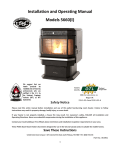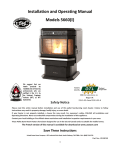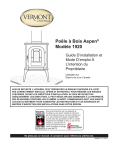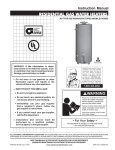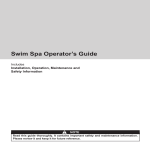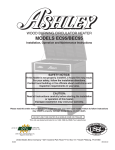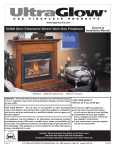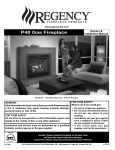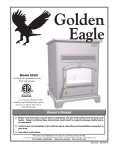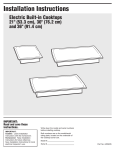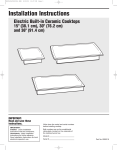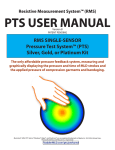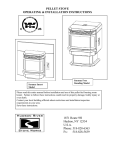Download United States Stove 24A Specifications
Transcript
Installation and Operating Manual Model AP5660L Tested & Listed by Portland Oregon USA OMNI- Test Laboratories, Inc. Report #: 215-S-32-4 This unit is not intended to be used as a primary source of heat. SAFETY NOTICE Please read this entire manual before installation and use of this pellet fuel-burning room heater. Failure to follow instructions may result in property damage, bodily injury, or even death. If your heater is not properly installed, a house fire may result. For everyone’s safety, follow all Installation and Operating Directions. Never use makeshift compromises during the installation of this appliance. Contact your local building or fire officials about restrictions and installation inspection requirements in your area. These Pellet Stove Room Heaters have been designed for use in the US and Canada and are suitable for mobile homes. The French version of this manual is available for download at www.usstove.com Save These Instructions United States Stove Company • 227 Industrial Park Road, South Pittsburg, TN 37380 • Phone #: (800) 750-2723 1 Part No.: 852072E TABLE OF CONTENTS Topic Page(s) Introduction ....................................................................................................................................................3 Safety Information .........................................................................................................................................4 Specifications ............................................................................................................................................... 6 Operating Instructions ................................................................................................................................7-8 Thermostat Installation ..................................................................................................................................9 Clearances to Combustibles .......................................................................................................................10 Installing Your Room Heater ..................................................................................................................11-18 Mobile Home Installations ..........................................................................................................................19 Vent Termination Locations ........................................................................................................................21 Maintenance ..........................................................................................................................................22-25 Troubleshooting .....................................................................................................................................26-27 Wiring Diagram ...........................................................................................................................................28 Replacement Parts List ..............................................................................................................................29 Warranty Card .............................................................................................................................................31 2 Introduction The entire family of United States Stove Company thanks you for purchasing your new pellet burning room heater. At U.S. Stove, we build all of our products with a hands-on approach to detail and quality. Our old world team of Craftsmen take great pride in their superior workmanship to ensure you have years of trouble free use of your pellet heater. U.S. Stove Pellet Burning Room Heaters have been tested and listed for installation in residential, mobile home and alcove installations. U.S. Stove Pellet Burning Room Heaters are available in free standing pedestal and fireplace insert versions. U.S. Stove Pellet Burning Room Heaters have been certified by OMNI-Test Laboritories to: ASTM E1509-04, ULC/ORD-C1482-M90, ULC-S627-00, & ULC-S628-00 The performance of your Pellet Stove Room Heater can be affected by the type of pellet fuel you choose to burn in it. It is important to use only pellet fuel that is dry and free from dirt or other impurities. The Pellet Fuel Industry has established standards for wood pellet manufacturers. We recommend that pellet fuel used in all U.S. Stove Pellet Burning Room Heaters meet or exceed the following specifications: Fines (fine particles): Bulk Density: Size: Ash Content: Moisture Content: Heat Content: Maximum through a 1/8” screen Minimum 40 lbs per cubic foot Maximum 3/8” Diameter by 1-1/2” length 1% Maximum (Premium grade) 3% Maximum (Standard grade) 8% Maximum Minimum 8,200 btu’s per hour It is important to note that the ash content of the fuel and frequency of operation will determine the frequency of which you will be required to clean your Pellet Stove. A high ash fuel may result in daily cleaning, while a low ash content fuel may result in less frequent cleaning. Occasionally, impurities in the fuel will cause a hard mass build up in the burn pot of your Pellet Stove. Impurities, such as silica, can virtually form little glass balls when subjected to the high heat generated in the burn pot. When allowed to collect, a hard base build up may block air flow through the burn pot, which will significantly affect the performance and efficiency of your Pellet Stove. It is a good idea to check the burn pot for any hard mass buildup or other blockage on a daily basis, and if necessary let the burn pot cool and then clean the burn pot. U.S. Stove Company realizes that it cannot control the quality of pellet fuel you choose to use in your Pellet heater; U.S. Stove assumes no responsibility for that choice. CAUTION: BE SURE TO STORE PELLET FUEL A MINIMUM OF 3 FEET (914.5MM) AWAY FROM THE PELLET HEATER. RADIANT HEAT CAN IGNITE THE FUEL. Please note that the rating label is located on the inside of the hopper lid. 3 SAFETY INFORMATION Be sure to read the entire owner’s manual prior to installing and operating this Pellet heater. Failure to follow these instructions could result in fire, property damage, bodily injury or even death. This stove’s exhaust system works with negative combustion chamber pressure and a slight positive chimney pressure, it is extremely important to ensure that the exhaust system is sealed and airtight. The ash pan and viewing door must be securely fastened in order for the unit to be airtight. This Pellet heater will not operate using natural draft or without a power source for the blowers. CAUTION: Burning fuel creates carbon monoxide and can be hazardous to your health if not properly vented. CAUTION: A working smoke detector must be installed in the same room as this product. It must be installed at least 15 feet (4.57 m) from the appliance in order to prevent undue triggering of the detector when reloading. The use of grates or other methods of supporting the fuel is not permitted. This Pellet heater is designed to burn pellet wood fuel only. Do not use any other type of fuel; doing so will void any warranties stated in this manual. THE USE OF SOLID WOOD FUEL IS PROHIBITED BY LAW. This Pellet heater is designed for residential installation according to current national and local building codes. It is also approved as a mobile home heater, which requires connection to an outside combustion air source. When installing a Pellet Stove in a mobile home, it must be electrically grounded to the steel chassis of the home and bolted to the floor. Make sure that structural integrity of the home is maintained. Make sure that structural integrity of the home is maintained when passing vent pipes through walls, ceilings and roofs It is recommended that the exhaust vent be cleaned bi-annually or after every two tons of pellets. Soot or creosote may accumulate when the pellet heater is operated under incorrect conditions, such as an extremely rich burn (black tipped lazy orange flames). Do not operate the stove if the flame becomes dark or sooty or if the burn pot overfills with pellets. Turn the stove off and call your dealer. The grounded electrical cord must be connected to a standard 120 volt, 60 hertz electrical outlet. Ensure that the electrical cord is not trapped under the appliance and that it is clear of any hot surfaces or sharp edges. The ash pan and viewing door must be locked securely for proper and safe operation. DO NOT PLACE UNBURNED OR NEW PELLET FUEL IN THE ASH PAN. A fire in the ash pan may occur. Do not operate your pellet heater if you smell smoke coming from it. Turn it off, monitor it and call your dealer. Repair and servicing of your U.S. Stove Pellet Burning Room Heater may only be done by a qualified technician. Disconnect the power cord before performing any maintenance or repair. NOTE: Turning the Pellet Stove Room Heater to "off" does not disconnect power from the unit. The Pellet Stove Room Heater will not operate during a power outage. If a power outage or tripped circuit occurs, check for smoke spillage and open windows or doors to ventilate as necessary. CAUTION DO NOT CONNECT TO OR USE IN CONJUNCTION WITH ANY AIR DISTRIBUTION DUCTWORK UNLESS SPECIFICALLY APPROVED FOR SUCH INSTALLATIONS. Know the symptoms of carbon monoxide poisoning: headache, dizziness, weakness, nausea, vomiting, sleepiness, and confusion. Carbon monoxide reduces the blood’s ability to carry oxygen. Low blood oxygen levels can result in loss of consciousness and death. See a doctor if you or others develop cold or flu-like symptoms while cooking or in the vicinity of this appliance. Carbon monoxide poisoning, which can easily be mistaken for a cold or flue, is often detected too late. Alcohol consumption and drug use increase the effects of carbon monoxide poisoning. Carbon monoxide is especially toxic to mother and child during pregnancy, infants, the elderly, smokers, and people with blood or circulatory system problems, such as anemia, or heart disease. 4 SAFETY INFORMATION - continued Keep foreign objects out of the hopper. Contact your local building officials to obtain a permit and information on any installation restrictions or inspection requirements in your area. Be sure to notify your insurance company of your new U.S. Stove Pellet Burning Room Heater. Allow the Pellet Stove Room Heater to cool before performing any maintenance. Ashes must be disposed of in a steel container with a tight lid and placed on a noncombustible surface well away from your home. Check the venting system, at least twice a year, for creosote build-up. Keep all door/lid seals and gaskets in good condition. Adequate ventilation air is required to operate this heater. During operation, the heater draws air for combustion which can be assisted by the installation of outside combustion air inlets. However, certain weather conditions such as icing or use of kitchen exhaust fans may impact and reduce the effectiveness of vents. It is important to note that room air starvation will negatively impact the operation of the heater. If power outages with battery backup or room air starvation occurs during operation of heater, smoke in the house may result. This may trigger smoke detectors if they are installed. CAUTION: DO NOT CONNECT TO ANY AIR DISTRIBUTION DUCT OR SYSTEM. DO NOT USE CHEMICALS OR FLUIDS TO START THE FIRE. NEVER USE GASOLINE, GASOLINE TYPE LANTERN FUEL, KEROSENE, CHARCOAL LIGHTER FLUID, OR SIMILAR LIQUIDS TO START OR FRESHEN UP A FIRE IN THE HEATER. KEEP ALL SUCH LIQUIDS WELL AWAY FROM THE HEATER WHILE IT IS IN USE. USING THESE CHEMICALS COULD CAUSE BODILY HARM, HEATER DAMAGE AND WILL VOID THE WARRANTY. DO NOT BURN GARBAGE OR FLAMMABLE FLUIDS SUCH AS GASOLINE, NAPHTHA OR ENGINE OIL. HOT WHILE IN OPERATION. KEEP CHILDREN, CLOTHING AND FURNITURE AWAY FROM THE HEATER. CONTACT MAY CAUSE SKIN BURNS. YOUNG CHILDREN SHOULD BE SUPERVISED WHEN THEY ARE IN THE SAME ROOM AS THE STOVE. DO NOT ATTEMPT TO OPERATE THE HEAT EXCHANGER VENT TUBE CLEANER WHILE THE PELLET STOVE IS IN OPERATION OR COOLING DOWN; WAIT UNTIL PELLET STOVE HAS COOLED COMPLETELY BEFORE PERFORMING THIS PROCEDURE. ENSURE THAT PEOPLE ARE AWARE THAT THE HEAT EXCHANGER VENT TUBE CLEANER KNOB WILL BE VERY HOT DURING PELLET STOVE OPERATION AND CAN BE A BURN HAZARD. OTHER RADIANT SURFACES OF THE STOVE WILL BE HOT DURING OPERATION AND CAN BE A BURN HAZARD. A working smoke detector must be installed in the same room as this product. It must be installed at least 15 feet (4,57 m) from the appliance in order to prevent undue triggering of the detector when reloading. 5 SPECIFICATIONS Heating Specifications: Burn Rate: Hopper Capacity: *43,900 btu’s per hour or 5.1 lbs. of fuel per hour 55 lbs. *Dependent upon quality and heating value of pellet fuel. DIMENSIONS Figure 1 34.05 [865 mm] 27.32 in [693.9 mm] 24.41 in [620.0 mm] 6.00 in [152.4 mm] 13.70 in [348 mm] 20.50 in [520.8 mm] 10 50 in 6 Assembly Instructions STEP 1 Pull the factory installed wires out of the top of the stove. There will be two wire harnesses, ash shown. STEP 2 Unpack the top mount controls and ensure that the wiring harness shown is attached securely. STEP 3 Connect the factory installed wiring harnesses to the control panel as shown. STEP 4 Attach the control panel to the top of the stove, as shown. STEP 5 Secure with two sheet metal screws. 7 Control Panel PANEL CONTROLS The blowers and automatic fuel supply are controlled from a panel on the top of the 5660. The control panel functions are a follows. A. • • • • • • B. • • C. • D. • • • • • • • • • ON/OFF SWITCH (“POWER” BUTTON) When pushed, the stove will automatically ignite. No other fire starter is necessary. The igniter will stay on for at least 10 and up to 12 minutes, depending on when Proof of Fire is reached. The fire should start in approximately 5 minutes. The red light located above the “POWER” button will turn green when pressed and remain green until the stove is turned off. After pushing “POWER”, the auger motor is on for 3.5 minutes, off for 1 minute. During the remainder of the start-up period, the auger motor operates on the heat range “1” setting. During start up the heat level advance (Up and Down keys) will change the heat range indicator level accordingly, but there is no change in the stoves operating conditions until start-up is completed. During start-up ignition must occur within 12 minutes or the stove will error out and show E4. During the start-up phase, the Mode key does not function. LEVEL / TEMP ARROW BUTTONS These buttons when pushed will set the pellet feed rate, hence the heat output or heat range of your stove. The levels of heat output will incrementally change on the bar graph starting from heat range “1” to heat range “5”. °C / °F Button The °C / °F button changes the two digit display from degrees Celsius to degrees Fahrenheit. MODE (M/T) BUTTON The Mode of the stove can be switched between manual and controlled with a Thermostat. Separate LEDs to the left of the two digit display indicate the mode of operation – Manual or T-Stat. The stove has to be in normal operation to be switched from Manual to T-Stat mode. Manual mode operates according to the 5 set levels of feed on the bar graph from heat range “1” to heat range “5”. T-Stat mode works as follows: The stove has a built in Thermostat into the controls of the appliance. The temperature sensor for the T-Stat is located on the back of the stove behind the display board. Once the stove has gone into run mode the stove can be switch into T-Stat mode. The Up and Down Level / Temp Arrow buttons are used to change the desired set-point temperature. Once the desired temperature is reached the two digit display will flash for four seconds and reset to the actual room temperature. Once the stove reaches within 3°F of the desired temperature set point, it returns to the heat range that the stove was set on before it was switched to T-Stat mode (if the stove was running on heat range “5” when switched to T-stat mode when it gets within 3°F of the set point it will return to heat range “5”). Once the stove reaches the desired set-point, the stove will drop to heat range “1”. When room temperature drops below desired set-point the stove will ramp back up until it reaches the desired temperature. 8 Operation DO NOT USE CHEMICALS OR FLUIDS TO START THE FIRE - NEVER USE GASOLINE, GASOLINE-TYPE LANTERN FUEL, KEROSENE, CHARCOAL LIGHTER FLUID, OR SIMILAR LIQUIDS TO START OR “FRESHEN UP” A FIRE IN THIS STOVE. KEEP ALL SUCH LIQUIDS WELL AWAY FROM THE STOVE WHILE IT IS IN USE. DO NOT BURN GARBAGE OR FLAMMABLE FLUIDS SUCH AS GASOLINE, NAPHTHA, OR ENGINE OIL. HOT WHILE IN OPERATION. KEEP CHILDREN, CLOTHING AND FURNITURE AWAY. CONTACT MAY CAUSE SKIN BURNS. PROPER FUEL THIS STOVE IS APPROVED FOR BURNING PELLETIZED WOOD FUEL ONLY ! Factory-approved pellets are those 1/4” or 5/16” in diameter and not over 1” long. Longer or thicker pellets sometimes bridge the auger flights, which prevents proper pellet feed. Burning wood in forms other than pellets is not permitted. It will violate the building codes for which the stove has been approved and will void all warranties. The design incorporates automatic feed of the pellet fuel into the fire at a carefully prescribed rate. Any additional fuel introduced by hand will not increase heat output but may seriously impair the stoves performance by generating considerable smoke. Do not burn wet pellets. The stove’s performance depends heavily on the quality of your pellet fuel. Avoid pellet brands that display these characteristics: 1. Excess Fines – “Fines” is a term describing crushed pellets or loose material that looks like sawdust or sand. Pellets can be screened before being placed in hopper to remove most fines. 2. Binders – Some pellets are produced with materials to hold the together, or “bind” them. 3. High ash content – Poor quality pellets will often create smoke and dirty glass. They will create a need for more frequent maintenance. You will have to empty the burn pot plus vacuum the entire system more often. Poor quality pellets could damage the auger. We cannot accept responsibility for damage due to poor quality pellet. PRE-START-UP CHECK Remove burn pot, making sure it is clean and none of the air holes are plugged. Clean the firebox, and then reinstall burn pot. Clean door glass if necessary (a dry cloth or paper towel is usually sufficient). Never use abrasive cleaners on the glass or door. Check fuel in the hopper, and refill if necessary. NOTE: The 5660 Hopper can hold up to 60 lbs. of pellets. BUILDING A FIRE Never use a grate or other means of supporting the fuel. Use only the burn pot supplied with this heater. Hopper lid must be closed in order for the unit to feed pellets. 1. 2. 3. 4. During the start-up period: Make sure burn pot is free of pellets. DO NOT open the viewing door. DO NOT open the damper, the damper needs to be closed during start up. DO NOT add pellets to the burn pot by hand. NOTE: During the first few fires, your stove will emit an odor as the high temperature paint cures or becomes seasoned to the metal. Maintaining smaller fires will minimize this. Avoid placing items on stove top during this period because paint could be affected. THE HOTROD AUTOMATIC FIRESTARTER 1. 2. 3. Fill hopper and clean burn pot. Press “On/Off” button. Make sure green light comes on. The damper should be completely closed or open no more than ¼ of the way during start-up. This will vary depending on your installation and elevation. Once fire is established adjust for desired flame increasing the amount the damper is open as the heat setting is increased. (See “DAMPER CONTROL”) 4. Adjust feed rate to desired setting by pressing “Heat Level Advance” button. If fire doesn’t start in 12 minutes, press “On/Off”, wait a few minutes, clear the burn pot, and start procedure again. DAMPER CONTROL The damper control lever is located on the back of the stove on the lower left side. The dampener adjusts the combustion air. This control is necessary due to the varied burn characteristics of individual installations, different pellet brands and pellet feed rates. It allows you to improve the efficiency of your stove. Providing correct combustion air will reduce the frequency of cleaning your glass door and prevent the rapid buildup of creosote inside your stove and chimney. You should adjust the damper based on the fire’s appearance. A low, reddish, dirty fire can be improved by turning the dampener slightly to the right. A “blow torch” fire can be improved by turning the dampener to the left a little bit. 9 Operation As a general rule, on lower feed rate settings, the damper should be farther to the left closing it off. On higher feed rates, the damper should be open more by having it set more towards the right. Through trial and error, you will find the best setting. Consult your dealer if you need help. NOTE: On heat range “1”, damper should be either completely closed or open no more than a ¼ of the way. If damper is open to far, it can cause the fire to go out. OPENING DOOR If the door is opened while the stove is in operation it must be closed within 30 seconds or the stove will shut down. If the stove shuts down push the “On/Off” button to re-start your stove. The stove will have to fully shut down and turn off before you will be able to restart the stove. ROOM AIR FAN When starting your stove the Room Air Fan will not come on until the stove’s heat exchanger warms up. This usually takes about 10 minutes from start-up. IF STOVE RUNS OUT OF PELLETS The fire goes out and the auger motor and blowers will run until the stove cools. This will take 30 minutes or longer depending on the heat remaining in the appliance. After the stove components stop running all lights on the display will go out and the two digit display will begin flashing “E3” REFUELING • • The hopper and stove top will be hot during operation; therefore, you should always use some type of hand protection when refueling your stove. Never place your hand near the auger while the stove is in operation. We recommend that you not let the hopper drop below ¼ full. KEEP HOPPER LID CLOSED AT ALL TIMES EXCEPT WHEN REFILLING. DO NOT OVERFILL HOPPER. SHUTDOWN PROCEDURE Turning your stove off is a matter of pressing the “POWER” button on the display board. The green light will turn back to red when the “POWER” button is pushed. The auger motor will stop, and the blowers will continue to operate until the internal firebox temperatures have fallen to a preset level. WARNING: Never shut down this unit by unplugging it from the power source. 1. Your stove is equipped with a high temperature thermodisc. This unit has a manual reset thermodisc. This safety switch has two functions. A. To recognize an overheat situation in the stove and shut down the fuel feed or auger system. B. In case of a malfunctioning convection blower, the high-temperature thermodisc will automatically shut down the auger, preventing the stove from overheating. NOTE: On some units, once tripped, like a circuit breaker, the reset button will have to be pushed before restarting your stove. On other units the thermodisc has no reset button and will reset itself once the stove has cooled. The manufacturer recommends that you call your dealer if this occurs as this may indicate a more serious problem. A service call may be required. 2. If the combustion blower fails, an air pressure switch will automatically shut down the auger. NOTE: Opening the stove door for more than 30 seconds during operation will cause enough pressure change to activate the air switch, shutting the fuel feed off. The stove will shut down and show “E2” on the two digit display. The stove has to fully shut down before restarting. 10 CLEARANCES TO COMBUSTIBLES INSTALL ALL VENTS AT CLEARANCES SPECIFIED BY THE VENT MANUFACTURER! When your Pellet Stove Room Heater is being installed on a combustible floor it is mandatory that a 1/2” (13mm) thick noncombustible hearth pad be installed under the heater. The non-combustible hearth pad must extend at least 6” beyond the fuel loading and ash removal openings and at least the depth of the heater plus 6 inches (152mm) out in front of the heater. The floor protector must extend 2” (51mm) beyond each side of the exhaust vent. 2” BACK WALL 2” Figure 5 6” FLOOR PROTECTION USA 6” CANADA 8” USA 6” CANADA 8” FLOOR PROTECTION USA 6” CANADA 18” USA 6” CANADA 18” Figure 6 Alcove Dimensions 36” 35” 40” 11 INSTALLING YOUR ROOM HEATER You have already made the important decision of choosing your U.S. Stove Pellet Burning Room Heater; now your next step is to determine where to install your new pellet stove heater. To get the most efficient use of re-circulated heat, you should consider a room that is centrally located within your home. Choose a room that is large and open. It is Extremely Important to maintain proper clearances from any combustible surfaces or materials in the room where your heater will be located. You can find proper clearance measurements on page 11 of this manual and on the rating label of your pellet stove. The pellet stove can be vented through an exterior wall or into an existing masonry or metal chimney. The chimney must be lined if it is over 6” (150mm) in diameter or if it has a cross-sectional area of over 28 square inches (711mm2). Venting can pass through the ceiling and roof if approved pipe is used. Where passage through a wall, or partition of combustible construction is desired, the installation must conform to CAN/CSA-B365. DO NOT OBTAIN COMBUSTION AIR FROM THE ATTIC, GARAGE OR ANY OTHER UNVENTILATED AREA. YOU MAY OBTAIN COMBUSTION AIR FROM A VENTILATED CRAWLSPACE. DO NOT INSTALL A FLUE DAMPER IN THE EXHAUST VENTING SYSTEM OF THIS UNIT. DO NOT CONNECT THIS UNIT TO A CHIMNEY FLUE SERVING ANOTHER HEATER, FURNACE OR APPLIANCE. INSTALL VENT AT CLEARANCES SPECIFIED BY THE VENT MANUFACTURER. ONLY USE APPROVED MATERIAL FOR INSTALLATION, FAILURE TO DO SO MAY RESULT IN PROPERTY DAMAGE, BODILY INJURY, OR EVEN DEATH. This appliance is certified for use with listed 3 inch or 4 inch “PL” or “L” pellet venting products as well as Selkirk’s DirectTemp Vent system for pellet burning appliances. The use of other components other than stated herein could cause bodily harm, heater damage, and void your warranty. HORIZONTAL EXHAUST VENT INSTALLATION 1. Locate your pellet stove in a location which meets the requirements of this manual, but in an area where it does not interfere with the house framing, wiring, etc. 2. Install a non-combustible hearth pad underneath the pellet stove. This pad should extend at least 6” (152mm) in front of the unit. 3. Place the pellet stove approximately 15” (381mm) away from the interior wall. 4. Locate the center of the exhaust pipe of your unit. This point should then be extended to the interior wall of your house. Once you have located the center point, on the interior wall, cut a 7” (175mm) diameter hole through the wall. 5. The next step is to install the wall thimble, refer to the instructions which come with the wall thimble for this step. 6. Install the appropriate length of exhaust vent pipe into the wall thimble. See steps 11 and 12 when determining the correct length of exhaust vent to use. 7. Outside Fresh Air is Mandatory when installing this pellet stove room heater in airtight homes and mobile homes. Be sure that the outside air vent has an approved cap on it to prevent rodents from entering. Be sure to install in location that won’t become blocked with snow, etc. 8. The air intake pipe is equipped with a butterfly valve that is preset to maximum air intake. For optimum operating efficiency you may calibrate the butterfly valve to provide less intake air. (See Figure 7) Caution: Too much restriction on the intake air will cause dirtier burn, therefore, will require more frequent cleaning. 9. Connect the exhaust vent pipe to the exhaust outlet of your pellet stove. 10. Secure all vent joint connections with 3 screws. Seal the exhaust vent joint connections with high temperature silicone sealant. 11. Push the unit straight back to the interior wall, being sure to maintain the minimum clearances to combustibles 6” (152mm) to the back of the unit. Seal the annular space of the wall thimble and around the vent pipe with high temperature silicone sealant. 12. The exhaust vent pipe must extend at least 12” (300mm) out past the exterior wall. Seal the annular space of the wall thimble and around the vent pipe with high temperature silicone sealant. 13. Install an approved horizontal termination cap or if necessary install a 90° elbow and appropriate length of vertical venting. An approved vertical vent cap is recommended. 12 INSTALLING YOUR ROOM HEATER - continued HORIZONTAL EXHAUST VENT INSTALLATION Figure 8 Listed Horizontal Cap Exhaust Vent Combustion Air Intake with approved cap Wall Thimble Mfg. by Pellet Vent Mfg. 6” (152mm) Clearance to Combustibles Floor Protector 6” (152mm) Clearance Front Figure 9 6” (152 mm) Clearance Wall to Back of Unit Wall Thimble Exhaust Vent 45 Elbow or Listed Termination Rodent Mesh Cap 6” (152 mm) Combustion Air Intake with approved cap 12” (300mm) Non-Combustible Floor Protection Existing Floor (Combustible) 13 INSTALLING YOUR ROOM HEATER - continued FREESTANDING INTERIOR VERTICAL INSTALLATION 1. Locate your Pellet Stove Room Heater in a location which meets the requirements of this manual, but in an area where it does not interfere with the house framing, wiring, etc. 2. Install a non-combustible hearth pad underneath the pellet stove. This pad should extend at least 6” (152mm) in front of the unit. 3. Place your Pellet Stove Room Heater on the hearth pad and locate the unit in a manner that will leave the exhaust vent with a minimum of 3” (75mm) clearance to any combustible wall. 4. When installing the air intake, locate the center of the combustion air intake pipe at the back of your unit. Line up the center with the same spot on your exterior wall and cut a 2-1/2” (64mm) diameter hole through the wall. 5. Install the combustion air intake pipe. 6. Secure all vent joint connections with 3 screws. Seal the exhaust vent joint connections with high temperature silicone sealant. 7. Install a tee, with a cleanout, on the exhaust pipe found at the rear of your unit. 8. Install approved vent upward through the ceiling. When you pass through the combustible framing ensure that the appropriate ceiling firestop is used. You must maintain a minimum 3” (75mm) clearance to combustibles and keep any insulation away from the exhaust vent. 9. Extend the exhaust vent through the roof flashing and ensure that the vertical cap is approximately 36” (900mm) above the roof. Listed Termination Flashing 36” (900 mm) 3” (75 mm) Clearance to Combustibles Use Ceiling Firestop Use Ceiling Firestop 3” 3” (75mm) Clearance (75mm) Clearance to to Combustibles Combustibles 3” (75 mm) Tee with Cleanout 6” (150 mm) 6” (150 mm) Non-Combustible Floor Protection Combustion Air Intake with approved cap Existing Combustible Floor 14 Figure 10 INSTALLING YOUR ROOM HEATER - continued FREESTANDING EXTERIOR VERTICAL INSTALLATION 1. Locate your Pellet Stove Room Heater in a location which meets the requirements of this manual, but in an area where it does not interfere with the house framing, wiring, etc. 2. Install a non-combustible hearth pad underneath the pellet stove. This pad should extend at least 6” (152mm) in front of the unit. 3. Place your Pellet Stove Room Heater on the hearth pad and locate the unit in a manner that will leave the exhaust vent with a minimum of 3” (75mm) clearance to any combustible wall. 4. If installing the optional air intake, locate the center of the combustion air intake pipe at the back of your unit. Line up the center with the same spot on your exterior wall and cut a 2-1/2” (64mm) diameter hole through the wall. 5. Secure all vent joint connections with 3 screws. Seal the exhaust vent joint connections with high temperature silicone sealant. 6. Locate the center of the exhaust pipe, at the back of the unit. Line up the center with the same spot on the exterior wall a cut a 7” (178mm) diameter hole through the wall. 7. Install the wall thimble; (refer to the instructions which come with the wall thimble). 8. Install an approved exhaust vent through the wall; be sure to make sure that 3” (75mm) clearances to combustibles are maintained. 9. Secure all vent joint connections with 3 screws. Seal the exhaust vent joint connections with high temperature silicone sealant. 10. Install a Tee with a cleanout on the end of the exhaust pipe and then install approved venting upward from there. Be sure to install support brackets every 5’ (1525cm) to keep the venting straight and secure. 11. Extend the exhaust vent through the roof flashing and ensure that the vertical cap is approximately 36” (900mm) above the roof. Listed Termination Figure 11 Flashing 36” (900 mm) 6” (150 mm) Clearance 3” (75 mm) Clearance Wall Thimble Tee w/ Cleanout 6” (150mm) Support Bracket Non-Combustible Floor Protection Existing Combustible Floor Combustion Air Intake with approved cap 15 INSTALLING YOUR ROOM HEATER - continued SELKIRK DIRECT-TEMP VENT SYSTEM FOR PELLET STOVE HEATERS Images courtesy of Selkirk 16 INSTALLING YOUR ROOM HEATER- continued SELKIRK DIRECT-TEMP VENT SYSTEM FOR PELLET STOVE HEATERS Images courtesy of Selkirk UP AND OUT HORIZONTAL TERMINATION KIT FIGURE 12 17 INSTALLING YOUR ROOM HEATER- continued SELKIRK DIRECT-TEMP VENT SYSTEM FOR PELLET STOVE HEATERS Images courtesy of Selkirk STRAIGHT OUT HORIZONTAL TERMINATION KIT FIGURE 12 18 INSTALLING YOUR ROOM HEATER - continued SELKIRK DIRECT-TEMP VENT SYSTEM FOR PELLET STOVE HEATERS Images courtesy of Selkirk THROUGH THE ROOF VERTICAL TERMINATION KIT FIGURE 14 19 MOBILE HOME INSTALLATION Mobile home installation should be done in accordance with the Manufactured Home and Safety Standard (HUD), CFR 3280, Part 24. Canadian installations require that the heater must be connected to a 3 or 4 inch, factory-built chimney conforming to CAN/ULC-S629. See the installation illustrations in this manual for minimum height above the roof. U.S. Stove suggests the use of Selkirk’s Pellet Venting Products. Refer to their installation instructions for proper installation of the exhaust and combustion air intake. The chimney installation must allow for removal in case of mobile home transportation, especially outside connections. You may contact your local building authority or person having jurisdiction on height restrictions. In order for this unit to be installed in a mobile home the following criteria must be met: • The unit must be secured to the floor using lag bolts in the holes provided in the pedestal base. • Ensure that the unit is permanently electrically grounded to the chassis of your home with 18 gauge copper wire. IT IS MANDATORY TO TAKE THE COMBUSTION AIR FROM THE OUTSIDE WHEN INSTALLING THIS UNIT IN AIR TIGHT OR MANUFACTURED/MOBILE HOMES. CAUTION: THE STRUCTURAL INTEGRITY OF THE MANUFACTURED HOME FLOOR, WALL, AND CEILING/ROOF MUST BE MAINTAINED. MAKE SURE TO MAINTAIN AN EFFECTIVE VAPOR BARRIER BY SEALING WITH SILICONE WHERE THE CHIMNEY OR OTHER COMPONENTS PENETRATE TO THE EXTERIOR OF THE STRUCTURE. REFER TO AND FOLLOW THE CHIMNEY MANUFACTURER’S INSTALLATION INSTRUCTIONS. WARNING: DO NOT INSTALL IN SLEEPING ROOM. Figure 15 HEARTH PAD FLOORING STEEL FRAME GROUND WIRE, DIRECTLY TO METAL CHASSIS 1/4” LAG BOLTS, SECURELY FASTENED NOTE: Only the freestanding models are approved for installation into a mobile home. 20 VENT TERMINATION LOCATIONS Figure 22 21 MAINTENANCE FAILURE TO CLEAN AND MAINTAIN THIS UNIT AS INDICATED MAY RESULT IN POOR PERFORMANCE AND HAZARDOUS SITUATIONS. CLEAN THE HEATER FREQUENTLY AS ACCUMULATION OF SOOT, CREOSOTE OR FLYASH MAY OCCUR. NEVER CLEAN THE UNIT WHEN HOT. Burn Pot: Note: Let the unit cool to room temperature before inspecting the burn pot. Inspect the burn pot regularly to check that the holes have not become plugged. If necessary clean thoroughly. It is imperative that the burn pot be reinstalled the correct way or the unit will not light. The end of the burn pot with an igniter hole in it (see Figure 23) must be installed facing the rear of the unit. This hole allows the igniter to heat up the pellets to the point of ignition. Figure 23 Igniter Hole Burn Pot Removed Ash Pan Door 22 MAINTENANCE - continued Ash Removal - Freestanding Unit: Remove the ashes periodically to avoid unnecessary ash build up. Ash removal is as follows: 1. Let fire burn out and allow unit cool to room temperature 2. Clean the heat exchanger tubes (see Heat Exchanger Cleaning section) – Make sure Pellet Stove is at room temperature before touching 3. Open the ash pan door, remove the burn pot and empty into metal container 4. Vacuum to remove ashes from the firebox. BE SURE THAT ASHES ARE COOL TO THE TOUCH BEFORE VACUUMING. Some vacuum cleaners may leak ash into the room. Your vacuum cleaner should have a special filter or bag to eliminate leakage. 5. Remove ash pan and dispose of ashes into metal container 6. Reinstall ash pan 7. Reinstall burn pot. Disposal of Ashes Ashes should be placed in a steel metal container with a tight fitting lid. The closed container of ashes should be placed on a non-combustible floor or on the ground well away from all combustible materials, pending final disposal. If the ashes are disposed of by burial in soil or otherwise locally dispersed, they should be retained in the closed container until all cinders have been thoroughly cooled. Do not place other waste in the same container. 23 MAINTENANCE - continued Cleaning Heat Exchanger Tubes – Your Pellet Stove Room Heater is designed with a built in heat exchanger tube cleaner. This should be used every 2 or 3 days to remove ash build up on the heat exchanger tubes, which can reduce heat transfer. The handle, for the heat exchanger tube cleaner, is located in front of the vent tubes on front side of heater. Slide the rod front to back several times to clean the tubes then follow the instructions for ash removal. Gasket Figure 26 Heat Exchanger Cleaner Handle Periodically remove the clean outs on either side of the heat exchanger. Clean out the ash, then follow the instructions for ash removal. Check the gasket before replacing the clean out cover. If gasket is damaged new gasket can be ordered. Alternatively, high temperature silicone can be used to ensure a proper seal between the clean out cover and the stove body. Cover WARNING: DO NOT ATTEMPT TO OPERATE THE HEAT EXCHANGE TUBE CLEANER WHILE THE PELLET STOVE IS IN OPERATION OR COOLING DOWN; WAIT UNTIL PELLET STOVE HAS COOLED COMPLETELY BEFORE PERFORMING THIS PROCEDURE. Fans – DANGER: RISK OF ELECTRIC SHOCK. DISCONNECT POWER BEFORE SERVICING UNIT! Over time ash or dust may accumulate on the blades of the circulation & exhaust fans. The fans should be inspected, periodically, and if any accumulation is present vacuumed clean as the ash or dust can impede the fans performance. It is also possible that creosote may accumulate in the exhaust fan therefore, this must be brushed clean. The exhaust fan can be found behind the left side panel (facing the front of the heater). The circulation fan can be found behind the right side panel. To access the igniter, remove the air inlet tube and cover (2 screws) (Figure 27). The auger motor is located in the center rear of the unit. Note: When cleaning, take care not to damage the fan blades. Auger Motor Circulation Fan Exhaust Fan Figure 27 Ignitor 24 MAINTENANCE - continued Chimney/Vent System Cleaning: 1. Soot/Creosote Formation – When wood products are burned slowly, they produce tar and other organic vapors which combine with expelled moisture to form soot. The soot vapors condense in the relatively cool chimney flue, as a result, soot/creosote residue accumulates on the chimney lining. When ignited, soot/creosote makes an extremely hot fire which can damage the chimney or cause a house fire. If a soot/creosote fire occurs, shut down the heater immediately and call the fire department. 2. Soot and Flyash: Formation and Need for Removal—The products of combustion will contain small particles of flyash. The flyash will collect in the exhaust venting system and restrict the flow of the flue gases. Incomplete combustion, such as occurs during startup, shutdown, or incorrect operation of the room heater will lead to some soot formation which will collect in the exhaust venting system. The exhaust venting system should be inspected at least once every year or per ton of fuel burned to determine if cleaning is necessary. Door Gaskets: Gaskets around the door and window panes should be inspected, cleaned and repaired when necessary to maintain good seal. If the unit is operated with damaged gaskets a poor burn or possible fire hazard can result. Door Glass Removal and Replacement: Do not attempt to operate the unit with broken glass. Replacement glass may be purchased from your U.S. Stove Pellet Burning Room Heater Dealer. If glass is broken, follow these removal procedures: Replacement glass must be 0.197” thick tempered ceramic glass with a working service temperature of 1400 deg. F. Center Glass size: 10” x 10.67”. Side glass size: 4” x 10.67”. 1. 2. 3. 4. 5. Once the heater has cooled, remove the door from the heater. Remove the rope gasket from the door followed by the eight(8) nuts holding the glass retainer in place. While wearing gloves, carefully remove any loose pieces of glass from the door frame. Replace the glass and gasket, making sure the gasket runs the full perimeter of the glass edge. Re-install the retainer and eight nuts and rope gasket using high temperature silicone to adhere the gasket to the door. 6. Never use substitute materials for the glass. Glass Cleaning: (Clean as needed) 1. Do not attempt to clean the glass while unit is hot. Wait until the pellet heater has cooled and then use a soft cotton cloth and mild window cleaner or gas and wood stove cleaner. 2. Do not use abrasive cleaners. 3. Do not abuse the glass by striking or slamming the door. Task Maintenance Schedule Burn Pot Combustion Chamber Heat Exchanger Tubes Ash Pan Convection Fan Blades Combustion Fan Blades Hopper Venting System Glass Gaskets check daily weekly bi-weekly bi-weekly or every 10 bags of fuel annually annually bi-weekly or every 10 bags of fuel annually as needed anually 25 TROUBLE SHOOTING See replacement parts section for component locations. The heater will not light. • Check that the heater is plugged in and that the wall outlet has power. • Unplug the unit then check all electrical connections against the Wiring Diagram in this manual. • Check the fuse on the circuit board. • If a thermostat is used, ensure it is calling for heat. • If your heater still does not light, contact your local dealer for service. The heater will not operate when hot. • Check that the fuel hopper has enough pellets. • Check that the combustion air inlet is not blocked. Insufficient air supply may cause the fire to burn cold and may cause fuel build up, in the pot, and smother the fire. • Check that the exhaust fan is operating. If the fan is not operating properly, it may not generate enough vacuum in the firebox. • Check the 200°F high limit switch. This switch is manually reset. Check if it has tripped. If so, let cool and reset switch. Check for cause of overheating. If switch trips again, contact your local dealer for service • Check the vacuum switch by shorting out the vacuum switch then depress ON/OFF button to “OFF” and back to “ON”. If the unit starts to operate change the vacuum switch. • Check the exhaust temperature switch (located on the exhaust blower) by shorting out the exhaust temperature switch then depress ON/OFF button to “OFF” and back to “ON”. If the unit starts to operate change the exhaust temperature switch. Exhaust blower does not operate normally. • Check all wiring connections. • Apply 120 volts directly to the exhaust blower. If the blower does not run replace the blower. Circulation blower does not operate normally. • Check all wiring connections • Apply 120 volts directly to the circulation blower. If the blower does not run, replace the blower. Igniter will not light fuel. • Check electrical connections (including fuse) to the igniter • Check that the igniter tube, which touches the burn pot, is not plugged with ash. If it is plugged remove the debris (be sure to wait until everything has cooled to room temperature) • Check to see that burn pot is installed correctly. • If igniter still does not work, replace it. Note: The igniter should be glowing orange when in operation. The auger motor does not function normally. • If the auger shaft does not turn but the motors armature tries to spin then this is a sign your auger is jammed. Try to remove the blockage by poking at the fuel in the drop tube. If this does not work then empty the hopper and remove the auger cover and clear the blockage (Note: Before removing the auger cover, disconnect power to the unit). • Make sure the hopper lip is fully closed to engage the hopper lip interlock. • Check for voltage at the auger motor. If none, check circuit board fuse. Replace blown fuse with 1 amp fuse. • Ensure the exhaust blower is operating. • Check the vacuum hose for proper connection or damage. • Bypass the vacuum switch by placing a jumper wire on the two electrical connections. If the auger motor starts to function normally, replace the vacuum switch. • Check the manual reset on the 200° F high limit switch. If the switch has been tripped, check for the cause of the overheating. Reset the switch and check if the auger operates normally. • Bypass the 200° F high switch by placing a jumper wire on the two electrical connections. If the auger motor starts to function normally, replace the high limit switch. Do not operate unit with switch bypassed. • If the auger is not jammed and you have tried the other possible causes, connect 120 volts directly to the auger motor. If the auger motor does not work, replace the auger motor. 26 TROUBLE SHOOTING - continued The 200o F High-limit switch has tripped. • Reset the switch and determine the cause. It is normally a faulty circulation fan. If the circulation fan does not operate, apply 120 volts directly to the circulation fan. If it still does not operate, replace the circulation fan. Heater will not shut off. • If room thermostat is used, make sure it is turned down below the room temperature. • Disconnect one of the wires to the exhaust temperature sensor; the heater should then shut off. Replace sensor. • Depress the ON/OFF button to “OFF”. If the heater will still not shut off, disconnect power to the unit and call your local dealer for service. Heater Flame keeps going out on “LOW” setting. If the flame goes out and leaves fresh unburned pellets in the burn pot liner, then the fire is going out before the unit shuts off. • On the control panel, use HEAT button to turn the heat level up to the next setting. Poorer quality pellets require a slightly higher setting. • If it is on heat level 1, you may also adjust the fuel feeding rate slightly by pressing the Auger Trim button. • More air may be required. Door Glass has soot buildup at a fast rate and flame is lazy with black tips. • The vent pipe (including air intake) may be dirty or partially blocked restricting airflow to the unit. • The intake butterfly valve might be set at too low position. • Burn pot holes are blocked. Let the unit cool and clean burn pot and housing (be sure to follow instructions for disposal of ashes found in the Ash Disposal section) • Circuit board malfunction. Time the fuel feed light at each setting (after the stove has completed the initial “Start Up” sequence. Check the timing against the timing chart (found below), If the auger motor runs constantly there is a problem with the circuit board • Combustion/Exhaust blower is not operating. Check the combustion/exhaust blower is operating. If not, bypass the exhaust temperature switch. If the motor operates, replace the exhaust temperature switch. If the combustion/exhaust blower still does not work, apply 120 volts directly to the exhaust blower motor. If the motor still does not work, replace the exhaust blower motor. • Poor fuel quality. The type of pellets being used may be of poor quality. If possible, try a different brand of pellets (refer to fuel type information on page 3). Heat level 1 Heat level 2 Heat level 3 Heat level 4 Heat level 5 Control Board Timing Auger on 2 seconds Auger on 3 seconds Auger on 5 seconds Auger on 7 seconds Auger on 10 seconds 27 Auger off 5 seconds Auger off 3 seconds Auger off 3 seconds Auger off 3 seconds Auger off 3 seconds WIRING DIAGRAM 28 REPLACEMENT PARTS Contact your authorized U.S. Stove Pellet Burning Room Heater dealer to obtain any of these parts. Never use substitute materials. Use of non-approved parts can result in poor performance, safety hazards, and will void your Warranty. Key Parts No. Description Qty. Key Parts No. Description Qty 1 2 3 4 5 6 7 8 9 88161 88162 88082 891994 88163 88164 88165 892275 892274 Glass w/Gasket, Center Glass w/Gasket, Side Gasket, Door Burn Pot Brick Panel - Center Brick Panel - Left Brick Panel - Right Ash Pan Ash Pan Drawer 1 2 6 ft 1 1 1 1 1 1 18 19 20 21 22 23 24 25 26 80622 80604 80676 891998 891999 80606 80491 69794 40566 Blower, Convection Igniter PCB, Circuit Board Bushing Auger Motor, Auger Micro Switch Exhaust Grill Leg, Cast iron 1 1 1 2 1 1 1 1 4 10 11 891997 891540 Latch, Ash Pan Latch, Door 2 4 27 28 891995 892341 Main Door Magnet Latch Top Assembly 2 1 12 13 14 15 80549 80599 80601 88166 Pressure Switch Switch, Low-Temp Switch, Hi-Temp (w/ Reset Button) Gasket, Exhaust Blower 1 1 1 1 29 30 31 32 892035 892343 892037 892064 Panel Left, Cabinet Panel Right, Cabinet Hearth Plate Log, Decorative 1 1 1 1 16 80602 Blower, Exhaust 1 33 Housing, PCBA Controller 1 17 88167 Gasket, Convection Blower 1 34 892199 80631 PCBA Board 1 20 34 24 33 28 21 29 12 13 16 15 22 3 21 6 7 14 5 19 23 4 18 31 17 30 11 27 2 1 26 10 25 8 9 IN ORDER TO MAINTAIN WARRANTY, COMPONENTS MUST BE REPLACED USING ORIGINAL MANUFACTURERS PARTS PURCHASED THROUGH YOUR DEALER OR DIRECTLY FROM THE APPLIANCE MANUFACTURER. USE OF THIRD PARTY COMPONENTS WILL VOID THE WARRANTY. 29 HOW TO ORDER REPAIR PARTS THIS MANUAL WILL HELP YOU OBTAIN EFFICIENT, DEPENDABLE SERVICE FROM YOUR KING OR ASHLEY, AND ENABLE YOU TO ORDER REPAIR PARTS CORRECTLY. KEEP THIS MANUAL IN A SAFE PLACE FOR FUTURE REFERENCE. WHEN WRITING, ALWAYS GIVE THE FULL MODEL NUMBER WHICH IS ON THE NAMEPLATE ATTACHED TO THE HEATER. WHEN ORDERING REPAIR PARTS, ALWAYS GIVE THE FOLLOWING INFORMATION AS SHOWN IN THIS LIST: 1. THE PART NUMBER 2. THE PART DESCRIPTION 3. THE MODEL NUMBER: AP5660L 4. THE SERIAL NUMBER:____________________ United States Stove Company 227 Industrial Park Road P.O. Box 151 South Pittsburg, TN 37380 (800) 750-2723 WWW.USSTOVE.COM 30 CUT HERE WARRANTY INFORMATION CARD Name__________________________________________ Telephone #: (_____)_____________ City____________________________________________ State_______ Zip_________________ Email Address __________________________________________________________________ Model # of Unit________________________________ Serial #___________________________ Fuel Type: Wood Coal Pellet Gas Other _________________________ Place of Purchase (Retailer)______________________________________________________ City____________________________________________ State_______ Zip_________________ If internet purchase, please list website address___________________________________ Date of Purchase _______________________________________________________________ Reason for Purchase: Decoration Alternative Heat Cost Main Heat Source Other _________________________ What was the determining factor for purchasing your new appliance?_______ I have read the owner’s manual that accompanies this unit and fully understand the: Installation Operation and Maintenance of my new appliance. Print Name Signature Date Please attach a copy of your purchase receipt. Warranty not valid without a Proof of Purchase. CUT HERE Warranty information must be received within 30 days of original purchase. Detach this page from this manual, fold in half with this page to the inside and tape together. Apply a stamp and mail to the address provided. You may use an envelope if you choose. You may register online by going to www.usstove.com All information submitted will be kept strictly confidential. Information provided will not be sold for advertising purposes. Contact information will be used solely for the purpose of product notifications. 31 CUT HERE Fold Here Fold Here PLACE STAMP HERE United States Stove Company P.O. Box 151 South Pittsburg, TN 37380 32 CUT HERE

































